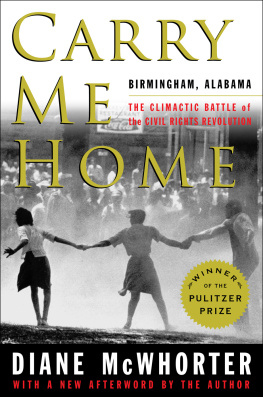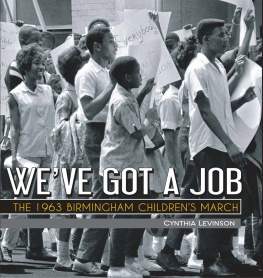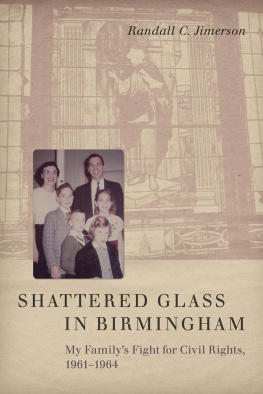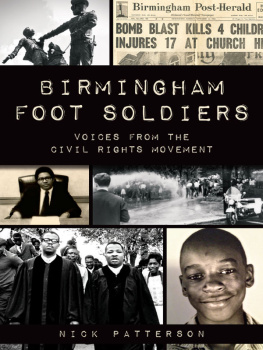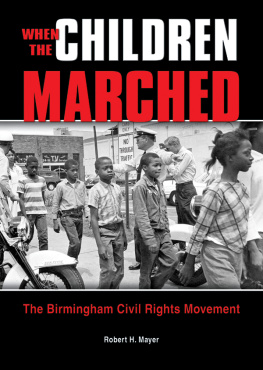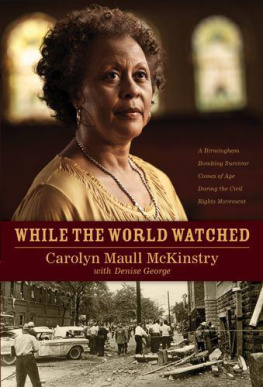Praise for Carry Me Home
[McWhorter] contributes significantly to the historical record.
The New York Times Book Review (cover review)
A tour de force, comparable in importance to J. Anthony Lukass Common Ground and Taylor Branchs Parting the Waters. Carry Me Home is destined to become a classic in the history of the civil rights revolution.
David Herbert Donald, author of Lincoln
A big, important book, a challenging portrait of an American city at the center of the most significant domestic drama of the twentieth century.
Jon Meacham, Newsweek
This epic of reportage and history about Birmingham, Alabama, in the early 60s reads like a big ambitious novel.... McWhorters complex narrative roves skillfully forward and backward... the cast is huge and vivid, the story brimming with courage, drama, villains, and heroes. The War and Peace of the civil rights movement.
Harry Bauld, People
Her narrative takes on the suspense of a detective novel.... Carry Me Home is an ambitious, panoramic history with enough personal memoir to make us see why Diane McWhorter cannot forgetand wants us to rememberthe momentous events that took place during one historic year in one Alabama city.
Francine Prose, O Magazine
McWhorters own involvement in the story... reenergizes the struggle, serving as a reminder that history is always personal.
The New Yorker
Fresh, sometimes startling details distinguish this doorstop page-turner told by a daughter of [Birminghams] white elite. [McWhorter] brings a gripping pace and an unusual, twofold perspective to her account, incorporating her viewpoint as a child... as well as her adult viewpoint as an avid scholar and journalist.
Publishers Weekly (starred)
No current book... delves more deeply into the nuances of the movement era than Diane McWhorters Carry Me Home.
Jack E. White, Time
Diane McWhorters powerful moral epic about the civil rights movement in Birmingham, Alabama, contains all the elements of first-rate history, including dauntingly thorough research, a sure grasp of the big picture as well as the tiny details that illuminate it, evocative writing that brings action and character springing off the page, and a novelists sense of how to mold a compelling narrative arc out of the innumerable molecules of historical fact.
Harper Barnes, St. Louis Post-Dispatch
The product of nineteen years of research, Carry Me Home is a brilliant work of history.
Craig Flournoy, The Dallas Morning News
A stunningly provocative and vividly written history.
Bruce Clayton, Pittsburgh Post-Gazette
An heir of the insightful, mid-century southern writer, Lillian Smith.
Nell Irvin Painter, Journal of Blacks in Higher Education
McWhorter is relentless... [a] rebellious insider and sleuth.... Her most important contribution is to follow the money and let it push the boundaries of her story back in time.
Jacquelyn Dowd Hall, Chronicle of Higher Education
A vivid, admirably nuanced, and wide-ranging history of the city that became ground zero in the civil rights struggle... dense, detailed, and insightful.
Kirkus Reviews (starred)
Carry Me Home is a staggering book... a twentieth century Iliad.
Kate Callen, San Diego Union-Tribune
Carry Me Home reads like a detective story as McWhorter relentlessly pursues her prey.... A powerful memoir and an absorbing social history, Carry Me Home belongs with Taylor Branchs Parting the Waters and Howell Rainess My Soul Is Rested.
James A. Miller, The Boston Globe
The force of Carry Me Home comes from the scope of the authors reporting.... She sketches the players in bold strokes and summons her themes with light ones, shaping the story of Birmingham into a lucid, elucidating drama about democracy.
Troy Patterson, Entertainment Weekly
Powerfully written, vividly recounted, McWhorters intimate yet magisterial narrative adds important insights to our understanding of the Ku Klux Klan and its connections with official power in the South.
Ruth Rosen, Los Angeles Times
Impeccable history... in the polished prose of a novelist... A terrifically brave book.
Lauren F. Winner, Newsday
Impressive... gutsy.
Elle
Thank you for purchasing this Simon & Schuster eBook.
Join our mailing list and get updates on new releases, deals, bonus content and other great books from Simon & Schuster.
C LICK H ERE T O S IGN U P
or visit us online to sign up at
eBookNews.SimonandSchuster.com

CONTENTS
T O THE MEMORY OF MY GRANDMOTHER,
M ARJORIE W ESTGATE M C W HORTER
A landscape to be seen has to be composed,
and to be loved has to be moralized.
G EORGE S ANTAYANA, The Sense of Beauty

PREFACE
L IKE THE SPIRITUAL from which the title is taken, this book is about death, redemption, and race. It builds to the national turning point known in history as the Year of Birmingham, 1963, when two things happened there, in the countrys most segregated city, that brought about the end of apartheid in America. The first milestone was the huge nonviolent demonstrations that Martin Luther King Jr. staged in the spring, as school-age witnesses for justice overcame the weapons of the state, including Commissioner Bull Connors police dogs and fire hoses. The spectaclesomething that seemed to belong in the Old Testament rather than the American midcenturynationalized the faltering civil rights movement and galvanized public opinion behind federal legislation to abolish segregation.
But because this battle over black freedom was, in effect, a continuation of the Civil War, there were bound to be casualties. The second of the emblematic events of Birminghamas President John F. Kennedy referred to the inspiration for his own Emancipation Proclamation, the bill eventually passed as the Civil Rights Act of 1964was the Ku Klux Klans bombing of the Sixteenth Street Baptist Church. In some ghoulish symmetry with the youth triumph of the spring, four black Sunday school girls were killed by the explosion.
I was a citizen of Birmingham in 1963, close to the age of the girls who died in the bombing. But I was growing up on the wrong side of the revolution. I knew nothing of what was happening downtown, even though my father, the renegade son of a prominent white Birmingham family, was taking an increasingly active role in opposing Martin Luther Kings movement. In my quest to understand how a family of Ivy Leagueeducated country clubbers could have produced a vigilante spirit like my father, I ended up discovering that the elite establishment of the city itself had nurtured the Ku Klux Klan and created the brutal conditions that incited a magnificent nonviolent revolution.
My education did not begin until after college, when I was living in Boston. The book review editor at an alternative weekly gave me (as a native of the tragicomic land of George Wallace) a copy of the Alabama volume in a 1976 Bicentennial series on the fifty statesnot to review, God knows, but to get it off his shelf. Several years later, I finally opened the book, expecting the coverage of my city to be a salute to the Pittsburgh of the South. What I found instead would change my life, embarking me on a fifteen-year expedition back to Birmingham.
The author of that Bicentennial tribute, a local historian named Virginia Van der Veer Hamilton, described the role of the power structure of Birmingham, the fathers and grandfathers of my schoolmates, who had materialized in the Chamber of Commerce building on a Tuesday in May 1963 to figure out how to make Martin Luther King stop the mass marches. They were so afraid of the social and economic consequences of dealing with King that only one man would agree to negotiate with him. He was a real estate executive named Sidney Smyer, and he was my cousin. It was only then that I realized that the events of Birmingham had anything to do with me.
Next page
